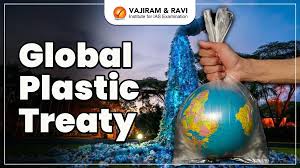Global South Unites in Call for Robust Financial Mechanism for Plastics Treaty
…GAIA Asia Pacific and GAIA Africa convene online panel to press for bold financing commitments ahead of INC-5.2
As momentum builds toward the next round of global plastic treaty negotiations (INC-5.2), delegates from across the Global South have issued a united call for a dedicated, robust financial mechanism to support the prospective international legally binding instrument on plastic pollution.
The online dialogue, hosted on June 24 by GAIA Asia Pacific and GAIA Africa and titled “Advancing a Robust Financial Mechanism for the Prospective Plastics Instrument,” brought together high-level delegates from Djibouti, Bangladesh, Ecuador, and Fiji.
Speakers emphasized that voluntary and fragmented funding language currently in the chair’s draft treaty text fails to reflect the strong consensus among 151 countries—largely from the Global South—calling for a standalone, multilateral fund.
Global South Demands Financial Justice
“If we want to have an ambitious treaty, we need ambition matched with the means to implement it,” said Ms. Hibaa-Haibado Ismael, INC focal point for Djibouti. “We must retain the proposal for a new dedicated multilateral and remediation fund and exclude false solutions like incineration and plastic credits.”
The panel highlighted that developing nations, small island developing states (SIDS), and downstream countries disproportionately suffer the consequences of plastic pollution, yet currently lack the resources to meet treaty obligations without predictable, accessible, and adequate financing.
Dr. Sivendra Michael, Permanent Secretary for the Ministry of Environment and Climate Change, Fiji, representing AOSIS, emphasized:
“Existing funds must not be repurposed to fulfill treaty obligations. They should complement—not substitute—the dedicated financial mechanism needed.”
Lessons from Existing Mechanisms
Delegates shared cautionary experiences from accessing funds under mechanisms like the Global Environmental Facility (GEF), citing bureaucratic delays, barriers to entry, and misalignment with national priorities.
Mr. Walter Schuldt Espinel, Minister at Ecuador’s Permanent Mission to the UN in Geneva, stressed:
“We cannot defer the creation of a dedicated fund to the COP process. The time to act is now.”
Dr. Shahriar Hossian, advisor to Bangladesh’s Ministry of Environment, Forest, and Climate Change, called for corporate accountability:
“This is an environmental health issue. We need Extended Producer Responsibility (EPR), a Plastic Pollution Fee, and financial mechanisms that hold polluters accountable while supporting a just transition.”
Political Will and Collective Action
The session closed with a strong appeal for political courage and coalition-building in the run-up to INC-5.2.
“Geneva must not become another scene of procedural paralysis,” Dr. Michael warned. “Finance is the gateway to implementation and the cornerstone of justice.”
Speakers agreed that securing an ambitious, binding, and implementable treaty hinges on securing a robust financial mechanism—with clear, equitable pathways for the Global South to access funding and technical support.
About the Organizers
GAIA Asia Pacific and GAIA Africa are regional branches of the Global Alliance for Incinerator Alternatives (GAIA), a worldwide alliance of grassroots groups and allies advocating for environmental justice and zero waste solutions.







yab7wi